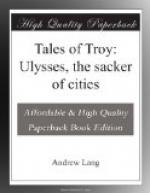The war might now have ended, but an evil and foolish thought came to Pandarus, a prince of Ida, who fought for the Trojans. He chose to shoot an arrow at Menelaus, contrary to the sworn vows of peace, and the arrow pierced the breastplate of Menelaus through the place where the clasped plates meet, and drew his blood. Then Agamemnon, who loved his brother dearly, began to lament, saying that if he died, the army would all go home and Trojans would dance on the grave of Menelaus. “Do not alarm all our army,” said Menelaus, “the arrow has done me little harm;” and so it proved, for the surgeon easily drew the arrow out of the wound.
Then Agamemnon hastened here and there, bidding the Greeks arm and attack the Trojans, who would certainly be defeated, for they had broken the oaths of peace. But with his usual insolence he chose to accuse Ulysses and Diomede of cowardice, though Diomede was as brave as any man, and Ulysses had just prevented the whole army from launching their ships and going home. Ulysses answered him with spirit, but Diomede said nothing at the moment; later he spoke his mind. He leaped from his chariot, and all the chiefs leaped down and advanced in line, the chariots following them, while the spearmen and bowmen followed the chariots. The Trojan army advanced, all shouting in their different languages, but the Greeks came on silently. Then the two front lines clashed, shield against shield, and the noise was like the roaring of many flooded torrents among the hills. When a man fell he who had slain him tried to strip off his armour, and his friends fought over his body to save the dead from this dishonour.
Ulysses fought above a wounded friend, and drove his spear through head and helmet of a Trojan prince, and everywhere men were falling beneath spears and arrows and heavy stones which the warriors threw. Here Menelaus speared the man who built the ships with which Paris had sailed to Greece; and the dust rose like a cloud, and a mist went up from the fighting men, while Diomede stormed across the plain like a river in flood, leaving dead bodies behind him as the river leaves boughs of trees and grass to mark its course. Pandarus wounded Diomede with an arrow, but Diomede slew him, and the Trojans were being driven in flight, when Sarpedon and Hector turned and hurled themselves on the Greeks; and even Diomede shuddered when Hector came on, and charged at Ulysses, who was slaying Trojans as he went, and the battle swayed this way and that, and the arrows fell like rain.
But Hector was sent into the city to bid the women pray to the goddess Athene for help, and he went to the house of Paris, whom Helen was imploring to go and fight like a man, saying: “Would that the winds had wafted me away, and the tides drowned me, shameless that I am, before these things came to pass!”




